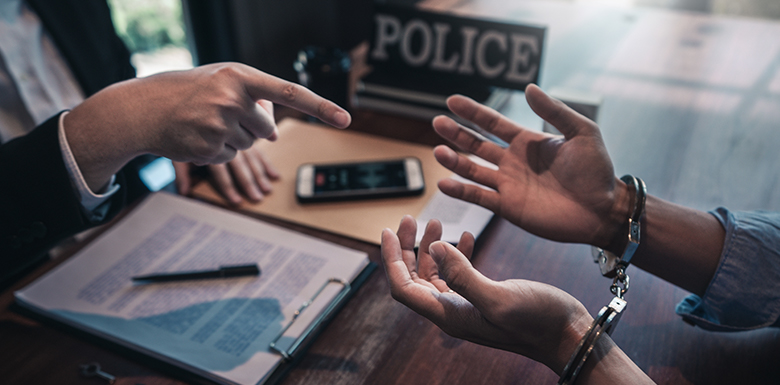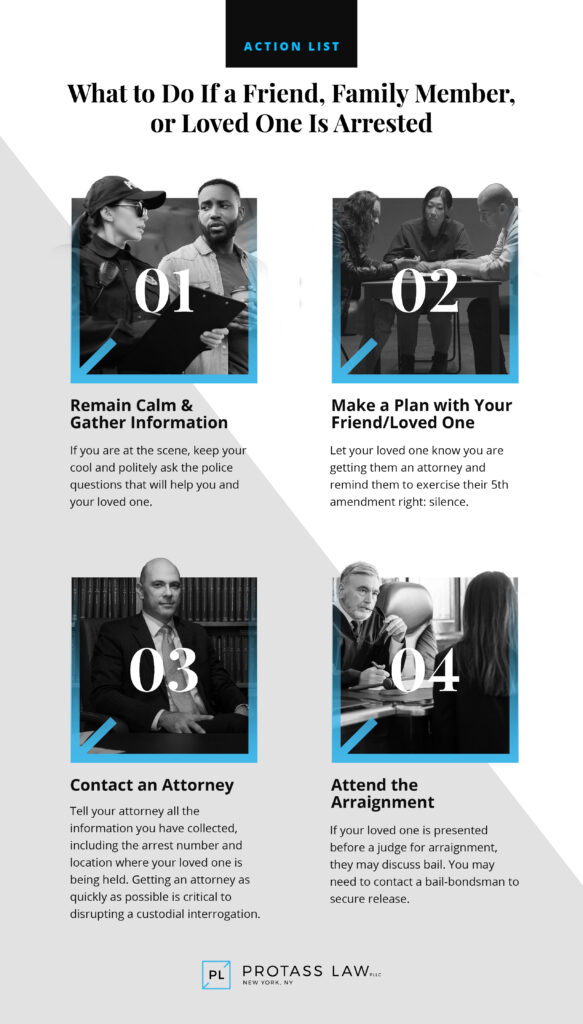
Topic: Criminal Defense
An arrest in New York City is, for most people, a frightening experience. You may be the first person to whom such a person reaches out. You may also be the person on whom such a friend, family member or loved one relies as a first line of defense. Although stressful and confusing, you can be remarkably helpful if you know what to do should you learn of an arrest other than, obviously, contacting and hiring a criminal defense lawyer.
Protass Law PLLC can be by your side – and be there for your friend, family member or loved one – right from the get-go. Call us right away at 212.455.0335 or use our online contact form if you, a friend, a family member or a loved one has been arrested. Regardless of who you call, the following are the steps you should take to help someone who has been stopped, arrested, charged with a crime and/or taken into custody:

1. Remain Calm and Gather Information
If you happen to be at the scene of an arrest, stay calm in your words, body language and emotions. Difficult as it may be, urge your friend/family member/loved one to also stay calm. You should then right-away start the process of collecting as much information as possible. Ask if your friend/family member/loved one is free to go. If not, ask if they have been arrested or are simply being detained. Ask what your friend/family member/loved one is charged with. Ask if the arresting officers have a warrant and, if so, the name of the court that issued the warrant. Ask if the arresting officers are from the state (such as the NYPD or New York State Police) or the federal government (such as the FBI, DEA or U.S. Customs and Border Protection). Also, take down the name and badge number (or other identifying information) of the arresting officer. And, if possible, get the address and telephone number for the location to which your friend/family member/loved one will be taken. You are also free to create a record of what transpired at the time of arrest by filming the events on your smartphone.
While people in the United States generally have a right to be free from warrantless searches and seizures, an exception exists for those who have been placed under arrest (principally to ensure that no weapon is present). So, if arresting officers conduct a pat-down or more thorough search, film it on your smartphone (if you are able) and create a list of anything they seize. Your friend/family member/loved one likely will be more thoroughly searched at the location to which they are taken (such as a local precinct). But you unfortunately will not be permitted to be present for such a search.
Arresting officers are, at their core, people who are simply doing their jobs. If treated respectfully and if asked politely, they likely will provide you with the information you seek and may even volunteer additional information that you may not even have thought to ask for. Never interfere, though, with what arresting officers are doing lest you risk criminal charges yourself (such as for obstructing governmental administration, resisting arrest or disorderly conduct).
2. Make a Plan with Your Friend/Family Member/Loved One
If a friend/family member/loved one has been arrested, assure them that they will be OK, that you will find a lawyer to represent them and that you will work to arrange for their release (should bail be set). Be sure that they have your contact information so that they can call you when given the opportunity to do so. And, of course, reassure your friend/loved one that you will do all you can to help.
If you have the opportunity to speak with them before they are taken into custody, tell them about “Criminal Defense Rule #1” – Exercise their 5th Amendment right to remain silent by not making any statements and not answering any questions (other than routine booking questions, such as name and date of birth). Also, tell them to tell the arresting officers that they want a lawyer. Doing so should stop law enforcement from even attempting to ask any questions of your friend/family member/loved one.
If you receive a call from the local precinct or other booking facility, the most important piece of information to collect is your friend/family member/loved one’s Arrest Number. If s/he does not have it, ask to speak with the arresting officer or detective and get that number. It is the critical piece of information you will need to track progress through post-arrest proceedings. Be careful in what you say on the telephone, though, because your call likely is being recorded. So, for example, do not ask any questions about the arrest and do not discuss whatever incident or facts resulted in arrest. As always, try to calm your friend/family member/loved one and assure them that you are working hard to find a criminal defense lawyer for them. And, take every opportunity to remind them to remain silent, not make any statements and not answer any questions.
If you were not at the scene of an arrest but learn that a friend/family member/loved one has been arrested, you can contact the District Attorney’s Office for the county in which the arrest took place or “central booking” for that county. New York City also has an online arrest locator.
3. Contact an Attorney
As soon as you learn that a friend/family member/loved one has been arrested, contact a criminal defense attorney. Tell them all the information you have collected, including the arrest number and location where your friend/family member/loved one is being held. The attorney may immediately travel to that location to speak with whomever has been arrested and to be present should law enforcement seek to ask questions or present him/her in a lineup. The involvement of a criminal defense attorney at the earliest possible time is critical to disrupting a custodial interrogation and protecting the rights of your friend/family member/loved one.
Once an arrest has been effectuated and if the arrest involved state law enforcement, there are only two ways “out” of the system – a DAT (Desk Appearance Ticket) or full processing and arraignment before a judge. Because of recent changes to the bail laws in New York, an attorney’s early involvement can impact upon the means of release and potentially shorten the amount of time that a friend/family member/loved one needs to spend in custody. A DAT is always preferable. If issued, your friend/family member/loved one will be released directly from the precinct to which s/he was taken with a slip of paper (that is, the DAT itself) instructing on the date to return to for their first court appearance. If a DAT is not issued, your friend/family member/loved one one will be processed through Central Booking and will appear in front of a judge for purposes of arraignment – a process that typically takes 12 to 24 hours depending on how busy the courts are on that particular day. By contrast, if your friend or loved one has been arrested by federal law enforcement, s/he will have to be presented before a judge for purposes of arraignment before release. Again, such an appearance typically takes place on the same day as an arrest.
4. Attend the Arraignment
If your friend/family member/loved one does not receive a DAT or is arrested by federal authorities, s/he will be presented before a judge for arraignment. At arraignment, your friend/family member/loved one will hear the charges against him/her and will plead not guilty. If not released on their own recognizance (“ROR”), the lawyers, prosecutors and judges will discuss bail. There is a direct relationship between the severity of the charged offense and the level of bail that may be set. In New York’s courts, judges make bail determinations based on risk of flight. If bail is set (and it usually is if your friend/family member/loved one does not receive a DAT or is not release on his/her own recognizance), you may need to contact a bail-bondsman to secure release. In the federal courts, judges make bail determinations based on the risk of flight and the danger to the community presented by the arrestee. If bail is set, arrestees and, sometimes, other financially responsible persons are called upon to sign a Personal Recognizance Bond (PRB) before release. Most PRBs do not require the posting of cash or a bond. But they may require the pledging of assets (such as a house) in support of the PRB. Bail amounts in the federal system tend to be significantly higher than in the state system.
Detention without bail is always a risk. If it is a state case, pre-trial detention will be at the Manhattan Detention Complex (also known as the “Tombs”) or Riker’s Island (https://www1.nyc.gov/site/doc/about/facilities.page). If it is a federal case, pre-trial detention will be at the Metropolitan Correctional Center (MCC) in lower Manhattan (https://www.bop.gov/locations/institutions/nym/) or the Metropolitan Detention Center (MDC) in the Sunset Park neighborhood of Brooklyn (https://www.bop.gov/locations/institutions/bro/).
An attorney will be able to guide you through any of the foregoing processes. Again, and as always, be supportive of your friend or loved one. That is what they need.
5. Be Supportive
If there has been an arrest, your friend/family member/loved one will be going through one of the most difficult and stressful periods of their life. You will want to stay in contact with them (and, potentially, their attorney). Your friend/family member/loved one will thank you for it. Your encouragement and support is invaluable.
Contact Protass Law, PLLC Today
If you, a friend, a family member or a loved one has been arrested in New York, you need a criminal defense attorney. Harlan Protass has over 25 years of experience fiercely defending individuals charged with a wide range of both state and federal offenses. Reaching out to Protass Law PLLC is the first step towards fighting for justice.
To schedule your free consultation, contact us online or call us at 212.455.0335.